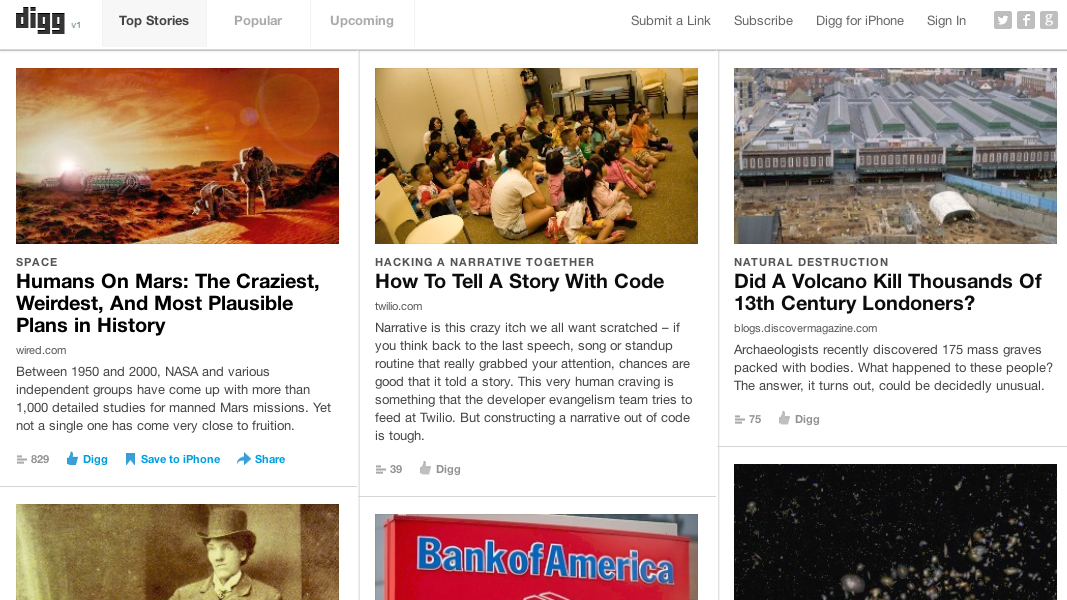
When Digg was sold for an insulting $500,000 (though as a note to any billionaires who happen to be reading, I am quite happy to be insulted in this fashion any time you like - call me), another once-proud internet establishment fell.
What really stands out is yet another demonstration of how there's no such thing as 'too big to fail' online. Whether it's Google putting its weight behind Google+, or Yahoo letting Flickr fade from the shining jewel of online photography to a cobwebbed husk that once knew hope, it seems like nothing kills a good thing - or, indeed, Digg - like finding success.
The two basic problems are usually the same. A promising service will be bought by some megacompany - usually Google, though Yahoo, Microsoft, Facebook and others have also waved chequebooks - and its users will cheer at the validation.
This then turns to tears with the realisation that a small group who live and breathe the product are now subject to the whims of management tiers who don't even remember they bought that wiki devoted to erotic fan-fiction about bacon, and certainly have no interest in supporting it.
Development slows to a crawl through a lack of resources or the creators being tied up in corporate matters, more often than not the tools are 'temporarily' closed, the original creators leave once their contracts expire, and only the users who made it popular enough to be noticed in the first place get the shaft. It's Kiss of Death #1. Kiss of Death #2 is what happened to Digg.
When a site is relatively small - 'relatively' being the key word - it's agile. New things are cool and shiny, users feel like part of the family, and change is a sign of growth and maturity. Past a certain point though, that stops. The more users you have, the less change is accepted, and the more the risk/reward balance of doing anything shifts towards the risk side.
Doing nothing is also dangerous
At the same time though, to do nothing is to be stagnant. Digg, for instance, added the DiggBar, which would force itself onto pages you visited, and then had to pull it.
Sign up for breaking news, reviews, opinion, top tech deals, and more.
The final nail in its coffin was Digg v4, which removed a number of features and tried to clear up very real problems like spam, only to send users fleeing in droves. Where did they go? Mostly a new upstart called Reddit.
For something like Digg, this doesn't matter too much. It's a very 'now' service - not in the sense of being current, but because it primarily matters on a day-to-day basis. You'd check Digg to see what was cool this hour, not dive into its archives for random reading or (outside a few eager hackers) build businesses around it, as happened with Google's many services - Reader and Maps being two of the biggest and most mashed up. Reader especially powers practically every standalone RSS reader app these days.
For more goal-orientated sites though, it's often tragic. Flickr especially may still be huge, but it's creatively dead. After years of complete neglect, Yahoo promised a big redesign this year... and months later, what have we got? A new upload panel and larger pictures on the contents page. Whole web services have been created in the time it took for someone there to grab a copy of JavaScript For Dummies and push that out.
The only real reasons to leave the site so painfully backward are cowardice or simply not caring. Neither was an issue back when Flickr was the flavour of the day. If only we could go back to then. It's almost a shame that sites can't fix a maximum number of users that they're aiming for, not just a minimum one. "We need 100,000 users to survive," they could say, "but over a million, we close our doors and just serve our fans."
That would never happen, obviously, both for financial reasons and because those lucky million would immediately become the most self-entitled people in the history of whining. Still, something to stop sites and services being victims of their own success wouldn't hurt - at the very, very least, the worldwide acceptance that functional export tools for data are not in fact still an option.
For the moment though, the net has to work in the here and now. It's one thing for a site or service to be beaten by something better - that's technological evolution, and survival of the fittest is what pushes things on.
It's just unfortunate that what we use today is almost guaranteed to be rendered obsolete tomorrow instead of staying ahead of the curve; not simply because the bigger something is, the more competitors rise up to steal its throne, but because we as users won't usually let it continue being all it can be.